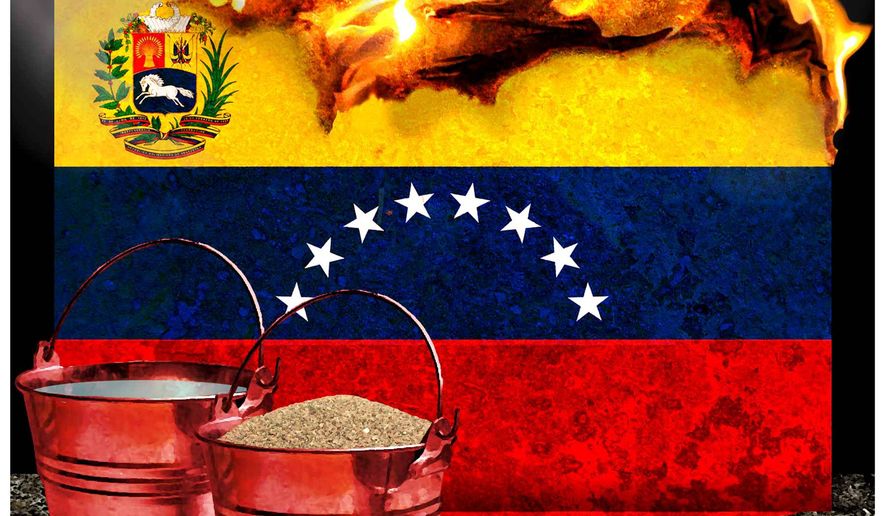OPINION:
Time is running out for Venezuela, a nation of 31 million with perhaps the world’s largest proved reserves of crude oil. The consequences of its descent for its neighbors and for the United States, whether into dictatorship, civil war, or bloody chaos, demand an immediate response — well beyond the call for dialogue, partial targeted sanctions, and resolutions.
The country’s dire conditions are spelled out in headlines and in the public report of Organization of American States (OAS) Secretary General Luis Almagro. That report cited brutal repression, killings of protesters, torture of political prisoners; violation of its constitution, according to its own attorney general; violation of its OAS treaty obligations, and according to the U.N., a man-made humanitarian disaster.
It is the dominant hemispheric crisis, one that combines hyperinflation, public impoverishment, scarcity of basic goods, citizen insecurity, and descent into a political netherworld of dictatorial governance and failed state status.
Venezuela currently ranks second in homicides worldwide, per the United Nations Office on Drugs and Crime (UNODC). Its capital city, Caracas, is the most dangerous city in which to live when measured by the likelihood of becoming a murder victim. It’s no wonder that 6 of 10 Venezuelans know of at least one murder in their neighborhood last year and 8 of 10 fear becoming murder victims themselves.
Economically, the country’s vast oil capacity — operating at only 2/3 capacity under a miserably managed state company — is already in hock for decades to come to China and others. Their loans go to pay the wage costs of a state bureaucracy increasingly run by party-selected military; and for little else. IMF inflation estimates are for 740 percent inflation this year and 2000 percent next; unemployment rising to 21 percent and GDP growth is already down 25 percent from two years ago and about to drop further.
That combination produces not nearly enough food in the markets, even if people had the money to buy, and so new surveys show a fifth of the population surviving on one meal a day and mounting malnutrition, neonatal, child and maternal mortality. It also means that fewer than a third of HIV/AIDS patients receive antiretroviral treatment, half of the country’s hospital operating theaters are out of service, and in 10 of 24 states there is no radiology treatment available.
President Nicols Maduro has responded to his self-made crisis and the daily protests by hundreds of thousands of civilians with police repression, arming paramilitary militias, using Venezuela’s controlled courts to try to usurp legislative powers from the elected National Assembly, and extending unconstitutional rule by executive decree. Its final effort is to call for a hand-picked constitutional assembly modeled on Cuba’s to void Hugo Chavez’s constitution and its civil and political freedoms. His United Socialist Party of Venezuela (PSUV) regime has already ignored the “popular” representation clauses of that document by arbitrarily rejecting the possibility of a recall referendum before the end of last year and by refusing to set a date for regional and municipal polls.
And so what has been the international community’s response? Till now, it has included targeted sanctions by the United States against some of the regime’s leaders that are most directly involved in drug trafficking and human rights abuse. MERCOSUR has suspended Venezuela. The OAS, after more than a year of indecision, has only just now obtained a majority to call for foreign-minister led pressure for the regime and the opposition to agree to a negotiated, but undefined, transition. That definition should include:
• Releasing all political prisoners.
• Accepting the legitimacy of the National Assembly and ending the executive state of exception.
• Publishing a timetable for fair, free municipal, regional, and national elections under a new, balanced, and internationally monitored electoral council this year.
• Permitting immediate humanitarian deliveries of food, medicines, and other basic necessities through international auspices distributed according to need, not politics, and in probability,
• Legislating an exit strategy in the National Assembly — and facilitated by asylum offered by OAS members — for those in the civilian and military hierarchy who cooperate to permit a democratic transition, conditioned on their leaving the country, and not having engaged in atrocities.
In the absence of agreement on these steps, the OAS should direct its member countries and relevant international organizations to adopt hemispherewide sanctions against regime leaders and where permitted under their laws, arrest warrants for those responsible for torture and other internationally-criminal actions.
Nearly 25 years ago, Peru’s President Alberto Fujimori carried out an auto-golpe (self-coup) against his own constitution, alleging the threat of insurgency from Sendero Luminoso. Within days, the United States, the World Bank, IMF, and IDB, with OAS support, froze loans and relations and at least blocked Fujimori’s plan, like Mr. Maduro’s, to exclude the people from any say on whether to have a constitutional convention. The times have changed, but the same case can be made. Hopefully this time a negotiated transition can be achieved without having to pass through the Fujimori authoritarian period and ultimately his arrest and imprisonment for human rights abuses, corruption, and violating democratic norms.
• Mark L. Schneider, a senior adviser at the Center for Strategic and International Studies (CSIS), previously served as senior vice president of the International Crisis Group.




Please read our comment policy before commenting.